_a.jpg)
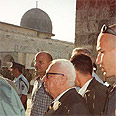
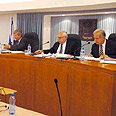
The October Riots were a series of violent clashes between Israeli security forces and Israel's Arabs. The riots took place during the first week of October 2000 and coincided with eruption of the al-Aqsa Intifada.
The clashes left one Israeli and 12 Israeli Arabs dead and are considered to be a social breaking point in the relationship between the State of Israel and its Arab citizens.
The catalyst which brought on the riots is believed to be a visit by then-Prime Minister Ariel Sharon to Temple Mount, on September 28, 2000. The visit was viewed as an deliberate attempt by Israel to infringe on Muslim presence on Temple Mount, and met with a violent riot which left 10 Palestinian demonstrator and 25 Israeli policemen injured.
The following Friday, saw the worshipers leaving the traditional Temple Mount prayer service riot violently, hurling rocks and tire irons at security forces and passers by. Police officers stationed in the Temple Mount compound were forced to evacuate the worshipers in the Western Wall Plaza, for fear for their safety. Dozens of police officers were wounded in the riot, forcing the Jerusalem Police to use crowd control measures to curb the riot. The subsequent rubber-coated bullets fire by police snipers left seven rioters dead and hundreds of others wounded.
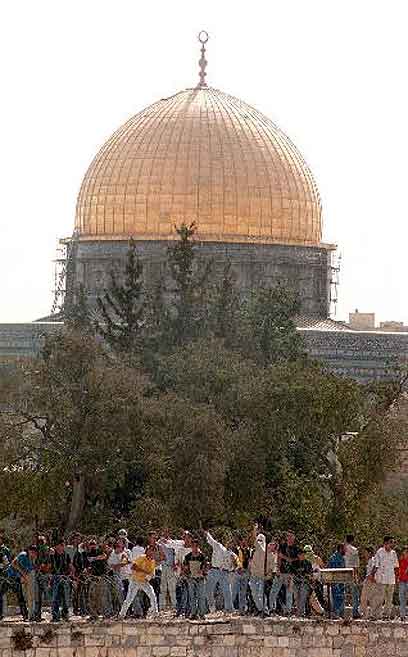
Unrest on Temple Mount (Photo: AP)
The following Friday, saw the worshipers leaving the traditional Temple Mount prayer service riot violently, hurling rocks and tire irons at security forces and passers by. Police officers stationed in the Temple Mount compound were forced to evacuate the worshipers in the Western Wall Plaza, for fear for their safety. Dozens of police officers were wounded in the riot, forcing the Jerusalem Police to use crowd control measures to curb the riot. The subsequent rubber-coated bullets fire by police snipers left seven rioters dead and hundreds of others wounded.
Riots erupt
Saturday, September 30, saw the first wave of violent clashes between security forces and Palestinians in the West Bank and the Gaza Strip. The Palestinian riots were echoed on Sunday, October 1, when hundreds of Israeli Arabs marched in support of their Palestinian brethren. A series of violent riots swept through Israel's Arab towns and major highways, especially in northern Israel, were blocked by rioters. At one point, the Galilee area was completely cut off from the rest of Israel.
Umm al-Fahm and Nazareth were the scenes of some of the gravest incidents of the day: In Umm al-Fahm, rioters had poured into the Wadi Ara Junction, blocking it completely. The inevitable clash with security forces saw the police use crowd control measures to try and disperse the riot, eventually firing live rounds into the crowd. The fire left two demonstrators dead and 39 injured. The day-long clashes between masked rioters and police forces in Nazareth rendered 44 men injured, most by rubber coated bullets.
Clashes also broke out in Israel's south: In the Bedouin town of Rahat, 300 people gathered outside the local police station and began stoning the building, eventually forcing the officers inside to fire teargas at the crowd. Bedouins living near Omer threw dozens of Molotov cocktails at cars driving on Highway 60's Shoket Junction.
Jaffa saw its share of rioting as well, as hundreds of its Arab residents stoned cars and buildings, set tires and cars aflame, smashed windows and hurled numerous Molotov cocktails at cars driving through its streets. Police forces attempting to control the crowds fired rubber-coated bullets and teargas at the demonstrators, injuring 10 and arrested 10 others.
_wa.jpg)
Rioting in Umm al-Fahm (Photo: Yariv Katz)
Jaffa saw its share of rioting as well, as hundreds of its Arab residents stoned cars and buildings, set tires and cars aflame, smashed windows and hurled numerous Molotov cocktails at cars driving through its streets. Police forces attempting to control the crowds fired rubber-coated bullets and teargas at the demonstrators, injuring 10 and arrested 10 others.
The harsh wave of violence was deeply disconcerting to Israel's government, which feared that the Arab sector had launched a de facto revolt against the State. The defense establishment – and especially the police – was given a wide mandate to curb violence and restore public order by any means possible. The police mounted a forceful response to the riots, allowing officers to use maces, rubber-coated bullets and teargas indiscriminately; and sanctioning the use of live fire and sniper fire, should the need arise.
The violence continued until October 4, as thousands of Israeli Arabs took part in demonstrations and marches. Random acts of violence now included sporadic arsons and by the riots' end, 100 fires burnt through hundreds of acres of forest is central and northern Israel.
On Saturday, October 7, 2000, a Jewish motorist was killed after his car was stoned while driving near the village of Jaser al-Zarka, just off Haifa.
October 8 saw a retaliatory riot against Israeli Arabs, as 200 of Nazareth's Jewish residents swept through the city streets, targeting Arab property. The Arab residents stoned the Jewish rioters and police forces rushing to the scene fired teargas and rubber-coated bullets at the Arab crowd; leaving two dead.
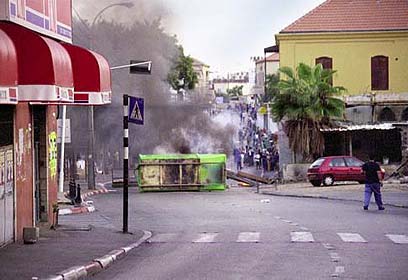
Unres in Jaffa (Photo: Dudu Fried)
The Or Commission
The riots, it seems, left a chasm gaping between the Arab and Jewish citizens of Israel. The police response to the violence, viewed by many as overly brutal, and the fact that the Arab sector demonstrated such a deep empathy for the Palestinians and the al-Aqsa Intifada, led to growing, open distrust and hostility between the sides.
Subsequent allegations of police brutality and excessive use of force against Arab citizens during the riots, which the sector's leaders claimed was indicative of government policy, prompted then-Prime Minister Ehud Barak to task Supreme Court Justice Theodore Or, with a State commission of inquiry to probe the events and their outcome.
After nearly three years, the Or Commission presented a report censuring the government and the police for they way the riots were dealt with:
"Prime Minister Ehud Barak was inattentive to the atmosphere in the Arab community and failed to apply recommendations suggesting the subject be studied further. He also failed to take the necessary steps, during the first two days of the riots, to prevent the police from using lethal measures to disperse demonstrations; nor did hi exercise his right to demand the police to keep him abreast on any event resulting in civilian deaths."
Then-Internal Security Minister Shlomo Ben-Ami, said the commission, "failed to maintain police readiness prior to the riots. He was not sufficiently aware of the potentially lethal results the use of rubber-coated bullets may carry, nor did he try and prevent their use… Ben-Ami failed to oversee police actions during the riots, nor did he demand his subordinates give him a full account of events which resulted in civilian deaths."
The commission further concluded that Ben-Ami's ministerial conduct "indicated a fundamental failure in his actions in office." The Or Commission recommended Shlomo Ben-Ami never serve as internal security minister again.
"Police Commissioner Yehuda Vilek failed to deploy his forces correctly once the riots erupted and allowed the use of rubber-coated bullets despite knowing said use may have lethal results. Vilek also failed to react firmly to the initial events resulting in civilian deaths in order to thwart their reoccurrence, nor did he ensure the events be properly documented and investigated."
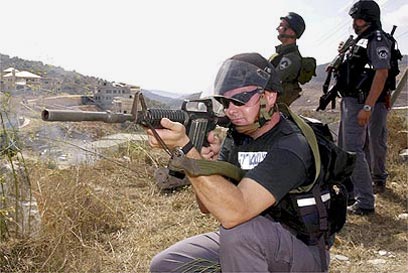
Police brutality? (Photo: Elad Gershgoren)
The commission further rejected Vilek's claim that he was unaware of the fact that police snipers used live fire on civilians, determining that "he was aware… and failed to inform the political echelon of the facts." The commission further found "fundamental professional failures in the commissioner's conduct and found that he breached the trust of his position. This commission therefore recommends Yehuda Vilek never be named for a senior position involving homeland security."
As for Northern Police Chief Alik Ron, the commission found that he "overstepped his authority and failed to prepare his officers for the likelihood of riots in the area." Once the riots erupted, continued the report, Ron "failed to deploy his forces in a way which could control the events." The commission further found Ron personally responsible for the sniper fire used on the Umm al-Fahm and Nazareth crowds, deeming it unwarranted. Ron was also found culpable for the officers' use of lethal crowd control measures and for the fact events involving civilian deaths were not properly recorded.
"The commission is impressed by Ron's dedication and leadership, as well as with the high regards in which his subordinates hold him and with his previous attempt to assist the Arab community in his sector; but nevertheless there are fundamental professional failures in his performance… This commission therefore recommends Ron never be named for a senior position involving homeland security."
Head of the Islamic Movement, Sheikh Raed Salah was found to have incited violence in the months prior to the riots. He was also found liable for spreading messages supporting violence as means for the Arab sector to achieve its objectives, messages negating Israel's right to exist and messages portraying Israel as an enemy state. Salah "also made a significant contribution to instigating the crowds by encouraging violent clashes."
Then-Knesset members Azmi Bishara and Abd al-Malik Dahamshe were also found liable for inciting violence and exacerbating the riots once they erupted.
Other operative recommendations by the Or Commission included a firm demand that the State instate full equality in the Arab sector, saying that Israel's governments over time have systematically failed to instate such equality and have been systematically discriminating against the sector in term of budgetary allocations, infrastructure etc.
The commission further recommended that the police be barred from using rubber coated bullets and indicated that "the Police Department's work is riddled with lacking reports, records and real-time debriefing," adding that the "senior police echelon "lacks a tradition of properly implementing past lessons."














